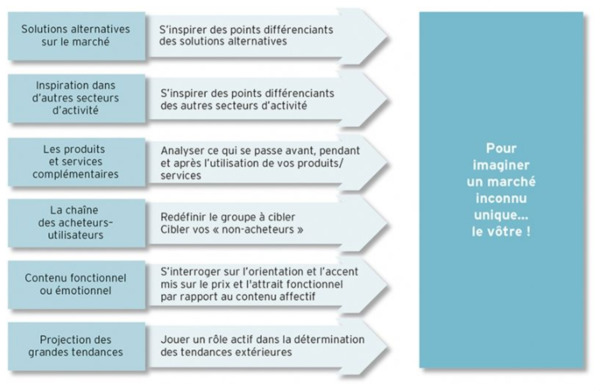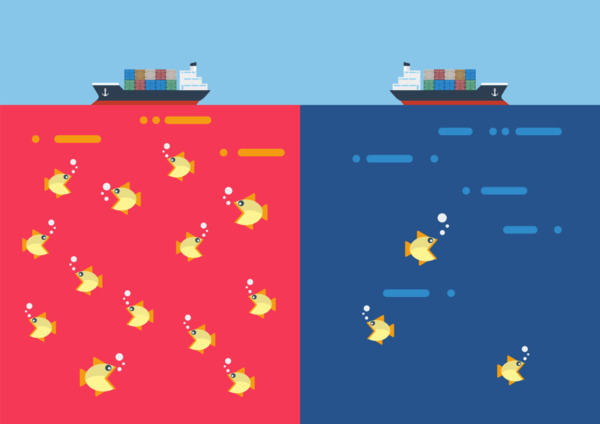 Your new post is loading...

|
Scooped by
Beeyond
January 2, 2024 12:49 PM
|
History reveals that there are no perpetually excellent companies. The same company can be brilliant at one moment and wrongheaded at another. It would appear, therefore, that the company per se is not the appropriate unit of analysis when exploring the roots of high performance.

|
Scooped by
Beeyond
December 24, 2023 10:20 AM
|
Businesses are constantly seeking strategies to stand out in a crowded market. The Blue Ocean Strategy emerges as a beacon, guiding companies toward uncharted waters where competition is irrelevant and new opportunities abound. Let’s dive into the depths of the Blue Ocean Strategy and explore its intricacies.

|
Scooped by
Beeyond
December 19, 2023 12:08 PM
|
For decades, the business and corporate world has been sold on three ideas: One, we should analyze what is, to shape our view of what could be. Two, more than ever today, and even more so in the future, technology innovation is the key to market creation and growth. And three, at the heart of innovation is the lone, smart, and gut-instinct entrepreneur.

|
Scooped by
Beeyond
December 18, 2023 8:04 AM
|
Imaginées par Kim et Mauborgne, dans leur ouvrage Stratégie Océan Bleu, les 6 pistes permettent d'aborder un marché existant avec des angles d'approche complètement nouveaux, et de trouver un marché sur lequel aucun concurrent n'est positionné, car il n'existe pas encore ! Pourquoi l'utiliser ? Remettre en cause les certitudes que nous pouvons avoir sur un marché existant, en le soumettant à 6 pistes de questionnement, qui vont permettre d'en redessiner les frontières.

|
Scooped by
Beeyond
December 9, 2023 12:41 PM
|
The strategy known as customer-centricity, once adopted by the masses, is now outdated. It has been replaced by something even more customer-focused: customer obsession, a core principle and culture that focuses an entire organisation around its customers.

|
Scooped by
Beeyond
December 9, 2023 12:02 PM
|
To gain competitive advantage, firms either outdo their competitors in a highly contested space or they avoid competition all-together. Disciples of Blue Ocean strategy will tilt towards the latter. Looking for blue ocean ideas is not a task which fits generative AI best. Large language models such as ChatGPT learn the patterns and structure of their input training data and then generate data that has similar characteristics.

|
Scooped by
Beeyond
November 21, 2023 6:37 AM
|
For the past three decades, the business mantra has been “customer first”. Yet focusing on retaining and expanding an existing customer base often results in finer segmentation and the greater tailoring of offerings to better meet customer preferences, which will likely lead companies into too-small target markets of an existing industry. The blue ocean strategist’s mantra is “noncustomers first”. By looking to noncustomers and building on powerful commonalities in what they value, companies can reach beyond existing demand to unlock a new mass of buyers.

|
Scooped by
Beeyond
November 21, 2023 6:36 AM
|
Making a blue ocean shift is about creating new demand and growing your industry, rather than competing for existing customers. One of the first steps of the blue ocean shift process is to identify the demand that exists beyond your industry. These are your noncustomers: buyers that don’t buy into your industry, product or service yet. The notion of noncustomers – anyone who is not a customer – is broad. So how can you identify your noncustomers? And how can you transform noncustomers into new customers?

|
Scooped by
Beeyond
September 23, 2023 10:48 AM
|
Solidement positionnée dans sa stratégie océan bleu, African Puzzle compte lever 1,7 million d’euros pour financer son développement. La startup développe en ce moment une application photo et vidéo qui permet à ses usagers de l’utiliser sans avoir besoin ni de lire ni d’écrire. De la gestion de projets à la création de fiches client au suivi de la trésorerie, en passant par l’agenda intelligent et le show room virtuel, African Puzzle WORKS se veut la secrétaire digitale des entrepreneurs qui se souviennent de tout et rendent leurs clients heureux.

|
Scooped by
Beeyond
September 23, 2023 10:44 AM
|
In the realm of business strategy, the concepts of “Red Ocean” and “Blue Ocean” have gained significant recognition as potent metaphors to describe distinct market conditions. These metaphors serve as valuable tools for comprehending the dynamics of competition and innovation within the business landscape. In this blog post, we will delve into the meanings and implications of Red Ocean and Blue Ocean strategies, shedding light on how companies can navigate their path to success in today’s fiercely competitive markets.

|
Scooped by
Beeyond
September 23, 2023 10:42 AM
|
Another major impact on Cirque Du Soleil’s current struggles is maintaining relevance to younger generations. As is pointed out in this New York Times piece detailing the issue, “nostalgia” comes up often in conversations about reinventing Cirque. If you understand the history of Cirque Du Soleil, there’s something ironic and staggering about that.

|
Scooped by
Beeyond
September 23, 2023 10:39 AM
|
Often, environmentally conscious business innovations that governments and companies champion are disruptive, displacing existing industries and the jobs that go along with them with new energy sources, materials or production methods. That’s certainly the case when, for example, governments take aim at the fossil fuel industry with the goal to disrupt and displace it due to concerns over carbon dioxide emissions.

|
Scooped by
Beeyond
September 14, 2023 3:08 AM
|
Ce qui conduit à la décision de mettre en place des projets Océan Bleu ou d’open innovation, c’est l’échec des dispositifs classiques à faire émerger des innovations qui marchent ; Ou la volonté d’ouvrir un nouveau marché/une nouvelle catégorie. Mais Il y a toujours un côté contre-culturel à penser l’innovation à moyen terme dans ces environnements, et d’une certaine façon beaucoup de résistance.

|
Scooped by
Beeyond
August 28, 2023 4:42 AM
|
In a world defined by swift digitization and ever-evolving landscapes, businesses seek not just survival, but supremacy. Conventional competition breeds limitation, whereas the Blue Ocean Strategy, a revolutionary concept by W. Chan Kim and Renée Mauborgne, charts a course toward innovation through unexplored market realms. Embracing this strategy, coupled with the tenets of Business Agility, marks the pathway to mastery.

|
Scooped by
Beeyond
August 25, 2023 5:42 AM
|
Sooner or later, everything old is new again... We may be at this point in tech, where supposedly revolutionary products are becoming eerily similar to the previous offerings they were supposed to beat.

|
Scooped by
Beeyond
August 5, 2023 8:10 AM
|
Creating a “blue ocean concept” is like searching for a rare, hidden gem on a well-trodden beach in a world dominated by competition. A blue ocean concept refers to a business that is innovative and cost-effective in a way that has virtually no competition.

|
Scooped by
Beeyond
August 5, 2023 8:07 AM
|
Given that customer satisfaction and citizen happiness are neither permanent nor fully obtainable, we need a more accurate way of defining and measuring their experiences. A way that captures the inherent cyclicality of emotional excitement and attachment. This is where the concept of ‘infatuation’ takes center stage. Infatuation is defined as: “An intense but short-lived passion or admiration for someone or something.”, synonyms: passion, enchantment, obsession, crush, fascination, rapture. Infatuation is the only word that simultaneously expresses a highly charged state of exuberance AND its transient, fleeting nature. Therefore, it provides the perfect lens for understanding the cyclicality of emotional transformation in customer relationships, and how to optimize them.

|
Scooped by
Beeyond
August 5, 2023 8:06 AM
|
Light production print falls between true, large-scale production printing and office printing. Print volumes for inkjet generally range from 500,000 to 1 million cut-sheet printed copies per month per printer. These print runs often offer additional features, such as higher resolution color, wide-format support, or different paper types. A customer might be a hospital that must produce billing invoices, lab results, and information pamphlets on a regular basis. A business like this doesn’t have the budget or space for a high-volume printing plant, but their needs still far exceed standard office printers.

|
Scooped by
Beeyond
August 3, 2023 6:57 AM
|
Innovation strategy goes beyond random acts of innovation and ensures that innovation efforts are aligned with the organization’s overall goals and objectives, ultimately driving sustainable growth and creating value for customers. It includes evaluating and selecting innovation projects, balancing short-term and long-term goals, and allocating resources accordingly. The innovation portfolio may consist of incremental innovations that improve existing products or processes, as well as more disruptive innovations that bring about fundamental changes or create entirely new markets.

|
Scooped by
Beeyond
August 3, 2023 6:54 AM
|
South Africa's wine tourism industry holds immense potential for growth and development. However, to fully capitalize on this opportunity, wineries must move beyond generic, standardized offerings and embrace innovative and personalized experiences. This blog post aims to provide advice to South African wineries on how to develop and enhance their wine tourism offerings based on the insights gained from a 2020 research article titled "Developing Blue Ocean Wine Tourism Experiences in the Cape Region."

|
Scooped by
Beeyond
August 3, 2023 6:43 AM
|
Disruptive innovation is far more commonly understood and involves creating a new market within existing industry boundaries. Nondisruptive innovation, by contrast, looks beyond those boundaries to create new markets. A key factor in this distinction is the impact the two forms of innovation have on society. When we see disruptive innovation, the new largely comes at the expense of the old, so this is accompanied by job losses and possibly even bankruptcies. As a result, the benefits that come from the new economic activity have to be placed alongside the very real social consequences that are brought by the displacement. While sometimes these consequences are short-term in nature, often they are very much not and can last for generations.

|
Scooped by
Beeyond
August 3, 2023 6:41 AM
|
The red ocean is an area of the market where competition can be fierce for companies and where there are serious struggles for superiority in order to grow. The blue ocean, on the other hand, is unexplored, open to development and growth, and does not yet contain any players. Accordingly, the blue ocean can be defined as business areas where there is no competition, unlike the red ocean. Therefore, blue oceans are profitable regions for businesses.

|
Scooped by
Beeyond
August 3, 2023 6:40 AM
|
In his book Tools of Titans—a book about the tactics, routines and habits of people who have achieved stunning success in life and business—well-known "life hacker" Tim Ferriss quotes a proverb: "Not my circus; not my monkeys." In Poland, where I come from, this proverb is used to emphasize that someone does not care about a given situation, does not take responsibility or ownership of it or does not take it seriously. The person simply doesn't mind it.

|
Scooped by
Beeyond
July 5, 2023 1:46 PM
|
People typically consider a limited number of promising ideas in order to manage the cognitive burden of searching through all possible ideas, but this can lead them to accept adequate solutions without considering potentially superior alternatives. Here we show that people systematically default to searching for additive transformations, and consequently overlook subtractive transformations. Across eight experiments, participants were less likely to identify advantageous subtractive changes when the task did not (versus did) cue them to consider subtraction, when they had only one opportunity (versus several) to recognize the shortcomings of an additive search strategy or when they were under a higher (versus lower) cognitive load. Defaulting to searches for additive changes may be one reason that people struggle to mitigate overburdened schedules, institutional red tape and damaging effects on the planet.

|
Scooped by
Beeyond
July 5, 2023 1:46 PM
|
This default to addition isn’t limited to assembling blocks, cooking and writing. Rather, thinking in pluses instead of minuses could well contribute to modern-day excesses such as cluttered homes, institutional red tape and even an overburdened planet, says behavioral scientist Benjamin Converse of the University of Virginia in Charlottesville. “We’re missing an entire class of solutions.”
|

Curated by Beeyond
BEEYOND is a consulting company in the field of disruptive innovation, accompanying established companies on out-of-the-core growth strategy, from creation of new concepts to product launch. Reach us at: contact@beeyond.fr.
|



 Your new post is loading...
Your new post is loading...




























































